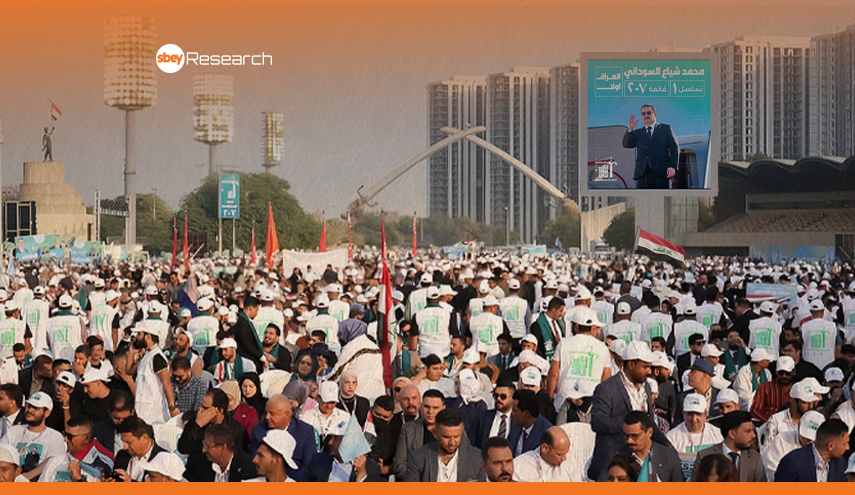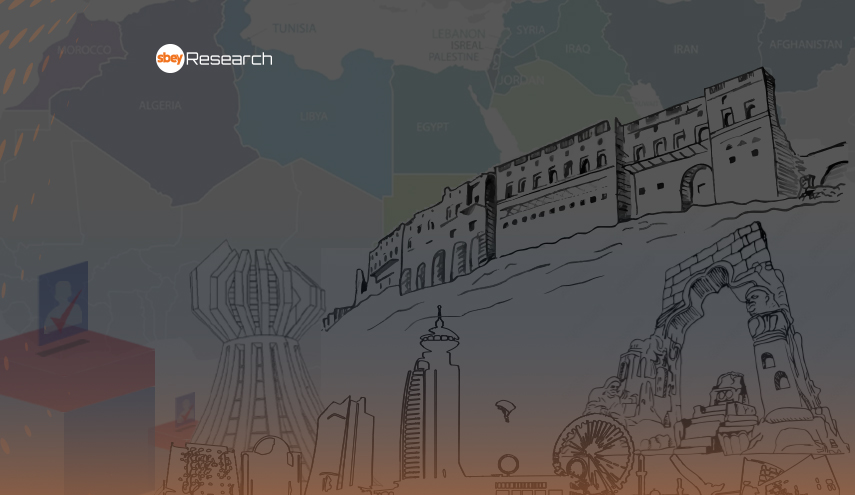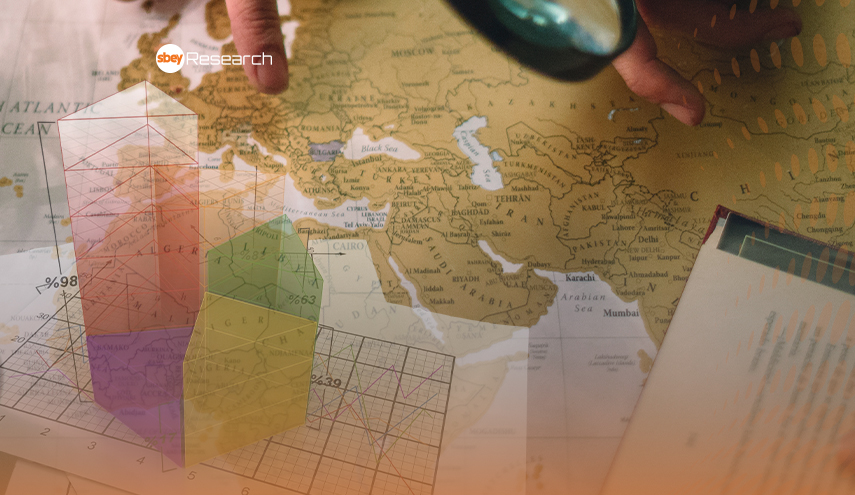

Analysis Date: August 18, 2025
Introduction: A New Era of Transformation
The Middle East is navigating a period of profound geopolitical transformation, transitioning from a relatively stable, US-dominated post-Cold War order to a volatile, multipolar landscape. This shift is not driven by a single event but by a confluence of powerful forces: the resurgence of great power competition, the enduring fallout from devastating regional conflicts, and the recalibrated ambitions of regional powers. As analysts at Al Jazeera Centre for Studies note, the world is moving from US-led unipolarity to a multipolar environment characterized by an "assertive non-West," with the Middle East
reemerging as a central arena. The old certainties have dissolved, replaced by a complex web of shifting alliances, proxy wars, and economic pressures.
The key drivers of this change are multifaceted. The United States, fatigued by decades of war and reorienting its focus toward competition with China and Russia, has seen its influence decline, even if the perception of a full withdrawal overstates reality . This has created a vacuum that other global powers—notably Russia and China—and ambitious regional actors like Iran, Israel, Saudi Arabia, and Turkey are actively seeking to fill. Simultaneously, the unresolved wounds of civil wars in Syria and Iraq, and the escalating Israel-Hamas conflict, continue to destabilize the region, serving as flashpoints for both local and international rivalries.
This analysis will dissect the region's most critical epicenters of conflict, from Iran's nuclear and off to Syria's fragile transition. It will then examine the strategic calculus of the United States, Russia, China, and the European Union as they navigate this new terrain. By synthesizing insights from leading think tanks—including the Center for Strategic and International Studies (CSIS), the Brookings Institution, and the Middle East Institute (MEI)—and reports from premier international media, this article aims to map the contours of the new geopolitical architecture of the Middle East.
Epicenters of Conflict and Transformation
The region's new dynamics are most visible in its key flashpoints. The situations in Iran, Iraq, Syria, and the Palestinian territories are not isolated crises but interconnected theaters where local grievances intersect with regional rivalries and global power plays.
Iran: At a Strategic Crossroads After Military Strikes
In mid-2025,a coordinated US-Israeli military campaign targeted Iran's nuclear facilities, creating a strategic shockwave across the region. The strikes, including "Operation Midnight Hammer" by the
U.S. and "Operation Rising Lion" by Israel, have forced Tehran into an existential dilemma, fundamentally altering the calculus of its nuclear ambitions and regional power projection.
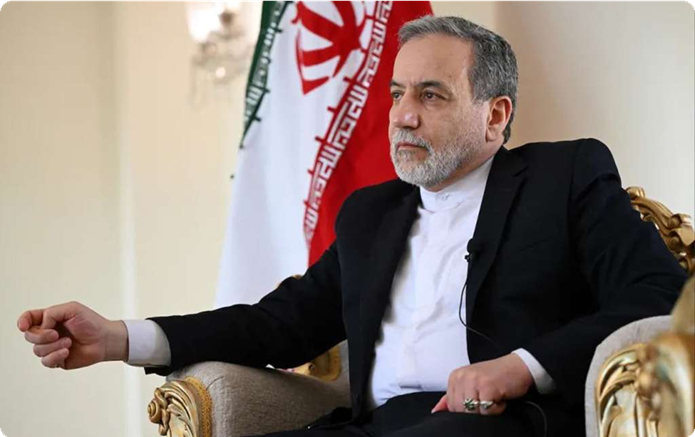
Iran's leadership faces a critical choice between defiance and diplomacy following military strikes on its nuclear program
Analysis of satellite imagery by the Center for Strategic and International Studies(CSIS) reveals significant physical damage at key sites. The Fordow facility was hit with Massive Ordnance Penetrators (MOPs),leaving large craters, while the Natanz and Isfahan complexes suffered extensive destruction to both above-ground and underground infrastructure. However, a fiercedebate rages over the true impact. While U.S. officials like President Trump claimed the facilities were "obliterated," a leaked Defense Intelligence Agency (DIA) assessment suggested a more modest setback of severalmonths . Experts like James Actonat the Carnegie Endowment argueIran may retainenough capability to builda weapon withina year, whileIsraeli sources claima setback of "many years." This uncertainty underscores the complexity of assessing the full impact of the strikes.
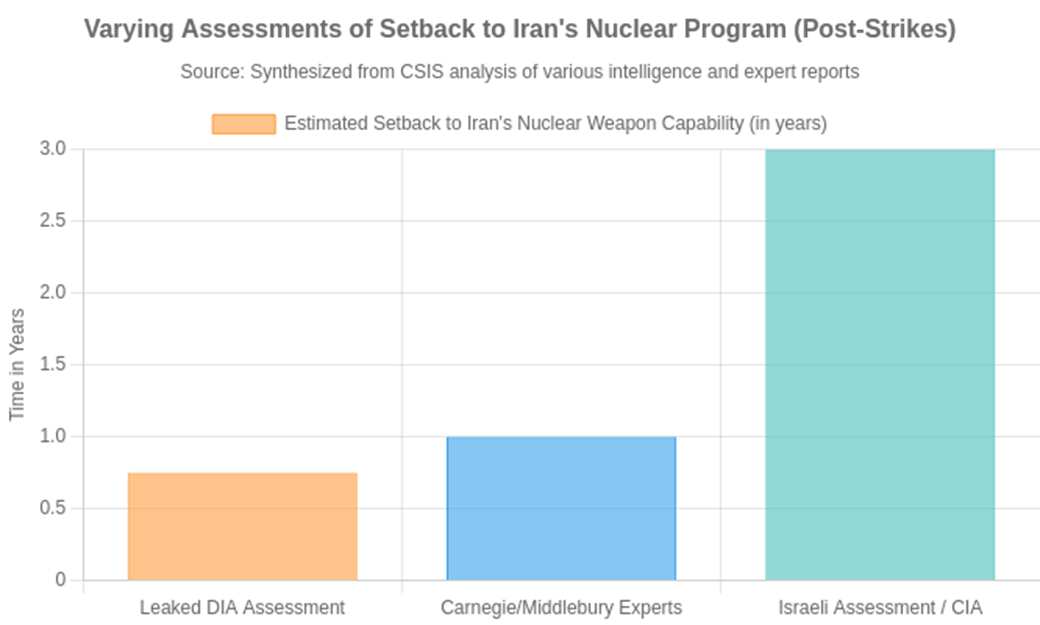
Beyond physical destruction, the campaign targeted Iran's human capital. Israel reportedly assassinated over a dozen leading nuclear scientists and military commanders, including the former head of Iran's Atomic Energy Organization. CSIS analysts emphasize that this erodes Iran's "tacit knowledge"—the unwritten, experiential expertise crucial for complex nuclear processes—which is far more difficult to replace than equipment or buildings . This has created a climate of fear that could deter recruitment for any future clandestine program.
The strikes have left Iran's clerical elite at a crossroads. As Reuters reports, they face a choice between defiance, which risks further devastating attacks on a weakened nation, and concession, which could trigger a leadership fracture and be seen as a capitulation. The strikes have set a precedent that military action is a viable tool for counterproliferation, potentially weakening the hand of those in Tehran who advocate for diplomacy and strengthening the case for a more aggressive, covert program, possibly with assistance from Russia or China.
Iraq: The Enduring Struggle for Sovereignty and Stability
More than two decade safter the US invasion, Iraq remains caught in a cycle of instability, struggling to establish a functional state amidst deep-seated sectarian divisions and pervasive external influence. The prevailing analysis from think tanks like the Brookings Institution is that the rise of ISIS was not the cause of Iraq's problems but a symptom of its quintessential ethno-sectarian civil war. Eliminating the group has not resolved the underlying dynamics that allowed it to flourish.
A core challenge is what Brookings scholars term ";decentralization by entropy."; While Iraq's constitution envisions a federal system, the central government in Baghdad is too weak to empower regional authorities effectively. Instead, power is simply grabbed by various militias, sectarian political elites,and peripheral actors,leading to fragmentation and chaos ratherthan functional governance. This centrifugal force paralyzes the political system, as even the once-cohesive Shi'a and Kurdish leaderships have fractured . These groups have deployed sectarian narratives to mobilize support, with disastrous consequences for Iraq's stability and deflecting attention from the need for good governance .
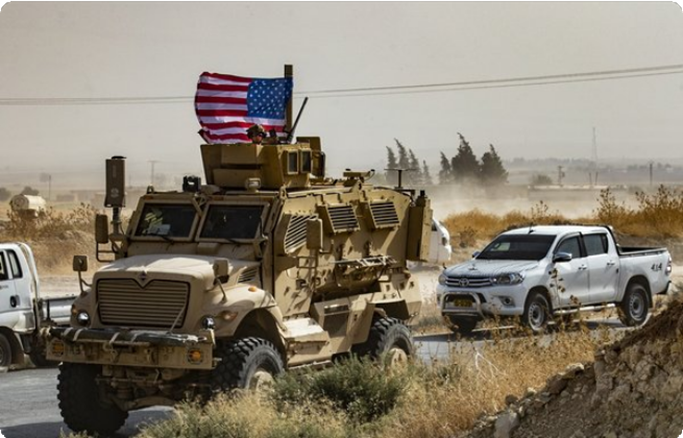
The continued presence of US forces is debated as a key factor in stabilizing Iraq and preventing a resurgence of conflict
Policy experts propose a multi-pronged path forward, though it is fraught with difficulty. The foundational requirement is a new, high-level nationalreconciliation agreement to rebuild trustbetween the Sunni and Shi'a Arab communities. This must be coupled with a dedicated effort to strengthen the central government's basic capacities, such as regaining a monopoly on the use of force by integrating or demobilizing powerful militias. There is also a pressing need to find a long-term, amicable solution for the Kurdish region, which could range from enhanced federalism to a peaceful separation. Many analysts argue that these political and economic tasks can only be accomplished with sustained American assistance. The debate over a continued US military and advisory presence of 5,000-10,000 troops remains central, with proponents arguing it is essential to prevent a relapse into widespread conflict and to help rebuild the Iraqi Security Forces .
Syria: Reimagining a Nation After the Fall of Assad
The sudden collapse of Bashar al-Assad's regime in late 2024 marked a seismic shift in the Levant, ending decades of brutal rule but plunging Syria into a new phase of uncertainty. An interim government, dominatedby the formerly designated terroristgroup Hayat Tahriral-Sham (HTS) and its opposition allies, has taken shape in Damascus, presenting the world with both a historic opportunity and a complex set of challenges .
Years of civil war have left Syrian cities in ruins, posing an immense challenge for any post-conflict government
The new authorities face a monumental task. The country is extraordinarily fragile, grappling with the debilitating effects of over a decade of civil war that has created one of the world's gravest refugee crises . The primary challenges include preventing state collapse, unifying a fragmented country where various armed groups and ad hoc governance structures still operate, and neutralizing remaining threats from ISIS and pro-Assad loyalists. A joint report by the Syria Strategy Project (a collaboration of MEI, the Atlantic Council, and the European Institute of Peace) outlines a comprehensive roadmap. It argues that international engagement, rather than the long-standing policy of isolation, offers the best chance to influence Syria's trajectory. The report stresses the urgent need for sanctions relief to allow for strategic investment and reconstruction, which regional governments stand ready to undertake.
Syria has become a new arena for geopolitical competition. The collapse of the Assad regime dealt a crippling blow to Iran's influence and weakened Russia's position. Other powers are moving to fill the void. Turkey, which is closely linked to the new rulers in Damascus, aims to shape the country's future . Meanwhile, Israel's aggressive actions, including strikes against military assets, risk inflaming tensions and complicating stabilization efforts. The United States and European powers face a critical decision: engage with the HTS-led government to guide its transition and prevent the emergence of a new terrorist safe haven, or maintain distance, risking further chaos. The success of Syria's transition will depend heavily on creating a representative political process and securing the country from both internal and external spoilers.
The Israel-Palestine Conflict: Escalation and Fading Hopes
The war between Israel and Hamas, which began in October 2023, has escalated into one of the most intense conflicts of the 21st century, inflicting a catastrophic human toll and shattering the prospects for regional peace. By August 2025, Israel's security cabinet had approved a plan to take full control of Gaza City, signaling a deeper and more prolonged military entanglement . The intensity of the Israeli bombardment has been described as unprecedented, with investigations by The New York Times using satellite imagery and AI to document the routine use of some of Israel's largest bombs in densely populated areas.
The escalating conflict has fueled intense confrontations and widespread protests, reflecting deep-seated tensions
The humanitarian crisis in Gaza has reached apocalyptic proportions. Reports from CSIS experts and international media describe a descent into mass starvation, with the enclave rendered "uninhabitable" and strewn with unexploded ordnance . Aid delivery has been severely hampered, with Israeli forces killing dozens of aid seeker sand even militants posing as charity workers Al Jazeera, . The sheer scale of destruction and civilian suffering has drawn sharp international condemnation and placed immense pressure on the Israeli government.
The prolonged war is systematically destroying any remaining hope for a two-state solution and is poisoning Israel's relations with the Arab world. The chances of normalizing ties with neighbors are fading, with nearly every state in the region condemning Israel's actions . This sentiment is echoed by analysts at the Middle East Institute, who note the divergent paths of Israel's military maximalism and Saudi Arabia's push for de-escalation. Domestically, Israeli society is increasingly fractured, with nationwide protests demanding an end to the war and the release of hostages . Externally, key allies are showing signs of strain; Germany announced a halt to certain military exports, a move Prime Minister Netanyahu called "disappointing," while European leaders have engaged in frantic, uncoordinated pushes for peace .
The Great Game: Global Powers in the Middle East
The conflicts and transformations within the Middle East are profoundly shaped by the strategies of external powers. The shiftingroles of the United States,Russia, China, and the EuropeanUnion are redefining the region's geopolitical landscape.
The United States: A Perceived Retreat and a Confused Strategy
For decades, the United States was the uncontested external power in the Middle East. Today, its role is more complex and contested. A comprehensive discussion among experts at the Brookings Institution concluded that while the perception of a complete US withdrawal overstates reality, American influence is "certainly on the decline." The US retains a significant military footprint and key strategic interests, but its diplomatic leadership and the American public's appetite for intervention have waned.This shift is driven by the broader reorientation of US foreign policy away from the post-9/11 "Global War on Terror" and toward great power competition with Russia and China. This has led to a strategy in the Middle East that many analysts describe as inconsistent or "confused, at best"; . There is a sustained, high-level focus on containing Iran and preventing it from acquiring a nuclear weapon, as evidenced by the recent military strikes. However, on other critical issues, such as the Israeli-Palestinian conflict or the civil war in Syria, Washington has often stepped back from a direct leadership role. The Trump administration's current priorities include resolving the Israeli-Palestinian conflict and limiting WMD proliferation, but its approach often relies on regional partners to carry more of the burden .
Russia: The Opportunistic Power Broker
Russia has successfully re-established itself as a pivotal player in the Middle East, leveraging a combination of militaryforce, diplomacy, and opportunism. The pivotal moment,as detailed in a major analysis by the Carnegie Endowment for International Peace, was its 2015 military intervention in Syria. This bold move saved the teetering Assad regime, secured Russia a long-term military presence in the Eastern Mediterranean, and forced the US and regional powers to deal with Moscow as an indispensable power broker.
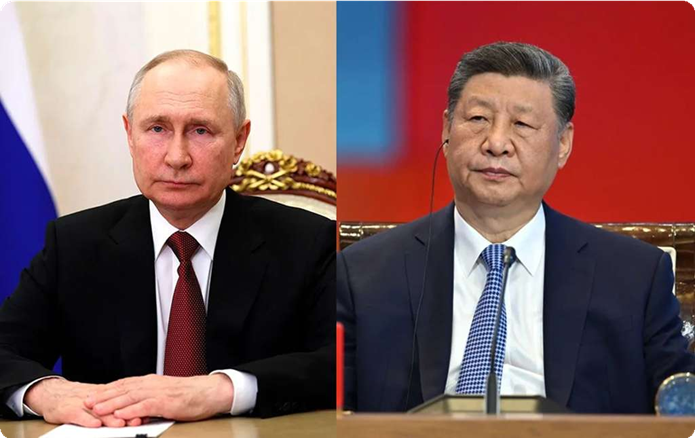
The strategic alignment between Russia's Vladimir Putin and China's Xi Jinping is reshaping global power dynamics, with significant implications for the Middle East
Moscow's strategy is defined by a pragmatic and cautious balancing act. It has managed to maintain simultaneously a military alliance with Iran in Syria, a vital economic partnership with Saudi Arabia through OPEC+ to manage oil markets, and a working relationship with Israel, for years turning a blind eye to Israeli strikes on Iranian targets in Syria . However, the full-scale war in Ukraine has reshaped this calculus. Russia has become more dependent on Iran for military supplies like drones, strengthening their partnership. At the same time, relationships with countries like Saudi Arabia and Turkey have become even more crucial for economic survival and bypassing Western sanctions .Russia's goal is not regional hegemony, which it lacks the resources to pursue. Rather, it aims to have a "seat at the table," to thwart US dominance which it views as inherently hostile, and to advance its own interests with relatively modest investments.
China: From Economic Giant to Political Player
China's role in the Middle East is undergoing a significant evolution, shifting from a purely economic actor to an increasingly assertive political player. For years, Beijing';s engagement was driven by its thirstfor energy—it is a top buyer of Iranian oil, often at a discountdue to sanctions —and by massive infrastructure investments under its Belt and Road Initiative (BRI) . This economic-first approach allowed it to maintain good relations with all sides, including bitter rivals like Saudi Arabia and Iran.
Recently, however, China has stepped into the diplomatic void. Its most significant move was brokering the normalization of relations between Saudi Arabia and Iran in 2023, a feat that signaled its arrival as a major political force. It has also sought to play a mediating role in the Israel-Palestine conflict . China's appeal lies in its stated policy of ";non-interventionism," which regional states often welcome as a contrast to the West's historyof military entanglements and democracy promotion. However, escalating regional conflicts are severely testing this balancing act. The Israel-Iran war, for instance, has strained Beijing's ability to maintain its neutral stance, forcing it to criticize Israeli military actions while trying to preserve its economic ties . This tension between its economic interests and its rising political ambitions will be a key dynamic to watch.
The European Union: A Fragmented Actor in Search of a Strategy
The European Union, despite its geographic proximity and significant economic ties to the Middle East, has largely failed to translate its weight into geopolitical influence. A consensus view, reflected in European Parliament research documents, is that the EU's "internal divisions have prevented it from playing a significant role." Accusations of double standards, particularly regarding the Israeli-Palestinian conflict, have further eroded its credibility in the region.
The EU's current approach is a patchwork of policies, including the European Neighbor hood Policy, the Union for the Mediterranean, and specific strategies for Iraq and Syria. However, these have proven insufficient to address the scale of the region's crises. The turmoil unleashed since late 2023 has led to urgent calls from within the EU to develop a "wider comprehensive EU Middle East strategy,"; particularly with a view to "the day after in Gaza." The stated goals of such a strategy would center on reviving the two-state solution, providing financial support for the Palestinian Authority and Lebanon, and strengthening partnerships with Gulf countries. Yet, the path to an effective, unified European strategy remains blocked by a lack of consensus among member states and the uncertainty surrounding the future direction of its key ally, the United States .
Conclusion: Navigating the New Geopolitical Architecture
The Middle East has entered a new and turbulent era. The region is no longer defined by a single external hegemon but by a fluid, competitive, and dangerous interplay between global powers and ambitious regional actors. The old architecture has crumbled, but a stable new order has yet to emerge. This analysis, drawing on the work of the world's leading strategic centers, reveals a landscape defined by three core realities.
First, the primary arenas for competition are the region's fragile and failing states. The power vacuums in Syria, Iraq, and now potentially Gaza are not merely internal matters; they are the battlegrounds where the strategic ambitions of Iran, Israel, Saudi Arabia, Turkey, the US, and Russia collide. The future of these states will determine the future balance of power in the Levant and the Gulf.
Second, economic and humanitarian crises are inextricably linked to geopolitical instability, creating a vicious cycle. Economic collapse in Lebanon and Syria, mass starvation in Gaza, and governance failures in Iraq are both a cause and a consequence of conflict. These crises fuel popular anger, empower non-state actors, and provide openings for external intervention.
Finally, the strategies of external powers are themselves in flux. The US is attempting to manage a region it no longer prioritizes, Russia is opportunistically seeking influence without the burden of hegemony, and China is cautiously stepping into a political role that tests its non-interventionist principles. This creates an unpredictable environment where regional actorshave more agencybut also face greater risks.
The central question for the coming years is whether these dynamics will lead to a new, albeit fragile, equilibrium or descend into what one Brookings analyst, describing the risk in post-ISIS Iraq, called a "fight of all against all" . The outcome will hinge on two factors: the ability of regional actors to redefine their national interests beyond zero-sum sectarian or ideological competition, and the willingness of global powers to prioritize genuine stabilization over the pursuit of narrow advantage in their great game.
References
The new geopolitics of the Middle East: America's role in a ... https://www.brookings.edu/articles/the-new-geopolitics-of-the-middle-east-americas-role-in-a-chan ging-region/
Middle East Program| Geopolitics and Foreign Policy - CSIS https://www.csis.org/programs/middle-east-program
The Geopolitics of Global Trade: Why the Middle East ... http://studies.aljazeera.net/en/analyses/geopolitics-global-trade-why-middle-east-matters-now-more-ever
Reimagining Syria: A Roadmap for Peace and Prosperity ... https://www.mei.edu/publications/reimagining-syria-roadmap-peace-and-prosperity-beyond-assad
Damage to Iran's Nuclear Program—Can It Rebuild? https://www.csis.org/analysis/damage-irans-nuclear-program-can-it-rebuild
Disentangling the Five Key Questions on Iran's Nuclear ... https://www.csis.org/analysis/disentangling-five-key-questions-irans-nuclear-program
Diplomacy or defiance: Iran's rulers face existential choice after US ... https://www.reuters.com/world/middle-east/diplomacy-or-defiance-irans-rulers-face-existential-choi ce-after-us-israeli-2025-08-14/
Iraq and a policy proposal for the next administration https://www.brookings.edu/articles/iraq-a-policy-proposal-for-the-next-administration/
Sectarianism, governance, and Iraq's future https://www.brookings.edu/articles/sectarianism-governance-and-iraqs-future/
Iraq and a policy proposal for the next administration https://www.brookings.edu/articles/iraq-a-policy-proposal-for-the-next-administration/
Pieces in motion: Rebalancing power in a new Levantine order | ECFR https://ecfr.eu/publication/pieces-in-motion-rebalancing-power-in-a-new-levantine-order/
Can Israel have a 'normal' place in the Middle East?https://www.aljazeera.com/video/inside-story/2025/8/9/can-israel-have-a-normal-place-in-the-mid dle-east
Israel-Iran war: how close is Tehran to having nuclear weapons? https://www.reuters.com/world/china/how-close-is-iran-having-nuclear-weapons-2025-06-18/
United States foreign policy in the Middle East - Wikipedia https://en.wikipedia.org/wiki/United_States_foreign_policy_in_the_Middle_East
Russia's Enduring Presence in the Middle East https://carnegieendowment.org/research/2024/11/russias-middle-east-diplomacy-relationship?lang=en
China's Evolving Middle East Strategyhttps://nationalinterest.org/blog/middle-east-watch/chinas-evolving-middle-east-strategy
China's Middle East Strategy in 2025: Between Iran and …https://behorizon.org/between-tehran-and-tel-aviv-chinas-strategic-balancing-act-in-the-middle-eas t/
China's Strategic Facilitation in the Persian Gulf Security ... https://www.stimson.org/2024/chinas-strategic-facilitation-in-the-persian-gulf-security-crisis/
China–Syria relations https://en.wikipedia.org/wiki/China%E2%80%93Syria_relations
The Israel-Palestine Conflict and China's Actorness in the Middle East https://gjia.georgetown.edu/2024/10/28/the-israel-palestine-conflict-and-chinas-actorness-in-the-m iddle-east-a-challenge-to-us-influence/
China's Approach to Palestine and Israel: Towards a Greater Role? https://mecouncil.org/publication/chinas-approach-to-palestine-and-israel-towards-a-greater-role/
[PDF] Wider comprehensive EU Middle East Strategy - European Parliament https://www.europarl.europa.eu/RegData/etudes/ATAG/2025/767229/EPRS_ATA(2025)767229_E N.pdf
[PDF] Wider comprehensive EU Middle East Strategy - European Parliament https://www.europarl.europa.eu/RegData/etudes/ATAG/2025/767229/EPRS_ATA(2025)767229_E N.pdf
Sectarianism, governance, and Iraq's future https://www.brookings.edu/articles/sectarianism-governance-and-iraqs-future/
Syria refugee crisis | The Guardian https://www.theguardian.com/world/series/syria-refugee-crisis
Israel's security cabinet approves plan to take control of Gaza City https://www.reuters.com/world/middle-east/israel-faces-backlash-home-abroad-over-gaza-war-esca lation-plan-2025-08-08/
Top Headlines on Israel and Hamas at war | Reuters https://www.reuters.com/world/israel-hamas/
Israel and Hamasat War News | Today'sLatest Stories - Reuters https://www.reuters.com/world/israel-hama-at-war/
Middle East News | Today'sLatest Stories - Reuters https://www.reuters.com/world/middle-east/
How Starmer, Macron and Merz Tried to Halt the War in Gaza https://www.nytimes.com/2025/08/10/world/europe/gaza-europe-peace-plan-trump-netanyahu.htm l
Diverging allies in Syria: Russia's and Iran's grand strategieshttps://therussiaprogram.org/diverging_allies_in_syriahttps://therussiaprogram.org/diverging_allies_in_syriaWhy is China so concerned about Israel-Iran tensions? https://www.opb.org/article/2025/06/24/what-is-at-stake-for-china-in-israel-iran-warChina's Middle East Strategy https://www.gmfus.org/news/chinas-middle-east-strategyChina's Middle East Strategy in 2025: Between Iran and ...
https://behorizon.org/between-tehran-and-tel-aviv-chinas-strategic-balancing-act-in-the-middle-eas t/[PDF] EU Foreign Policies in the Middle East--Iran, Iraq, Syria, https://www.wilsoncenter.org/sites/default/files/media/documents/event/kuzmicheva.pdf

